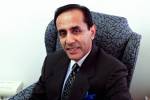Clinics offer low-cost care for those lacking insurance
Casey and Melissa Laub never expected to be without the safety net of health insurance but that’s what happened about five years ago when, because of the recession, Casey lost his job as a heavy-equipment operator.
Their biggest concern was that Casey Laub, 49, who is an asthmatic, wasn’t getting the medications he needed for the relief of symptoms that, if left untreated, could put him in the hospital.
“We were real worried because he needed that medicine, and it was just very scary,” Melissa Laub said.
After about two years without coverage, a friend told Melissa about a clinic that offers free health care — not just bandaging up scrapes or doling out antibiotics for the occasional malady, but long-term primary care as well as access to specialists such as cardiologists and obstetricians.
The clinic, located in Paradise Park near the intersection of Tropicana Avenue and Pecos Road, was created in 2010 by a nonprofit group called Volunteers in Medicine of Southern Nevada. It is specifically designed to meet the needs of the uninsured with the help of more than 700 volunteers, from physicians and nurses, to office staff.
For the Laubs, it has meant that Casey Laub is able to get his asthma medications and they have essentially found a new medical home.
“It’s worth having (Volunteers in Medicine) in this valley because there are so many in need,” said Melissa Laub, who volunteers at a food pantry and meets others who are struggling all the time. “It’s just a very caring, loving place and it needs to stay in this valley for everybody.”
Throughout the valley there are organizations trying to make a difference in the lives of those who often have nowhere to turn. The help comes in the form of nonprofit health care facilities, medical practices, government agencies, even retail clinics, offering services to uninsured and low-income Southern Nevadans through discounted and sometimes free health care.
This is vital in a state where 22 percent of the population is uninsured, second only to Texas at 24 percent, according to state health statistics from the Henry J. Kaiser Family Foundation. Nevada also has the highest percentage of uninsured children ages 0 to 18 in the nation at 19 percent, according to 2011 statistics.
It is not the perfect system. Compared with other major cities, Las Vegas has a way to go in terms of reaching its low-income and uninsured residents, as well as creating a more collaborative, accessible network of services, according to local health care experts.
“There are lots of people trying to do the right thing but it’s a real hodgepodge of activities, and it’s real hard,” said Thomas Schwenk, dean of the University of Nevada School of Medicine. “If you’re an uninsured patient, you kind of wander and sort of poke around and you try to find your way, but it’s very, very difficult to figure out where you can go and who will see you, who won’t see you.”
Florence Jameson, CEO and a founder of Volunteers in Medicine of Southern Nevada, knows firsthand what it means for families to struggle paying for health care. She was raised in California by a single mother with five children and they often relied on the kindness of a family doctor who knew the economic hardships they faced, she said.
Jameson, an OB- GYN, notes that at least 75 percent of the patients at the Volunteers in Medicine clinic are employed but still uninsured. There is a growing number of employees, for example, who are in a group known as the “29ers,” working less than 30 hours a week at a given job so employers don’t have to pay their health coverage, she said.
Others may be older adults, in their 50s or early 60s, who have lost their jobs but are still too young to receive Medicare, while some are just not able to work because of health issues.
Each year Volunteers in Medicine of Southern Nevada provides $4 million in free, long-term health care to patients who “are just marginally surviving” economically and sometimes letting chronic health conditions go unchecked for years, she said.
The nonprofit organization has to raise about $1 million a year to survive and relies on the donated hours of all the office and medical staff, including physicians from the University of Nevada School of Medicine, for example, and volunteers associated with medical programs at the College of Southern Nevada and Touro University.
At this time, there are plans to open a second clinic at Martin Luther King Boulevard and Madison Avenue, and Jameson would also like to establish a clinic in the Water Street area of Henderson.
Yet, while Volunteers in Medicine of Southern Nevada is just beginning to create a presence in Las Vegas, the nonprofit Nevada Health Centers was first established in the 1970s and is the largest network of community health centers in the state with 17 locations, six in Clark County.
Nevada Health Centers receives grants through the federal Community Health Center Program, which oversees medical care in underserved areas throughout the United States. Although treatment is not free, the centers serve low-income uninsured patients who pay for services based on a sliding-fee scale. In return they receive comprehensive primary care.
An unusual aspect of the centers, which also serve residents with insurance, is the collaboration that takes place to create patient-centered care, or a “health home,” which is accomplished by the primary-care physician and other medical professionals responsible for a patient’s welfare working as a team, CEO Walter Davis said.
“This makes sure they take care of the whole patient, that there’s one record that all of the providers in their network can see, and whatever the services are that the patient needs are all summarized in one location,” Davis said.
Some may also know Nevada Health Centers for the Mammovan, a mobile van that provides mammogram screenings for women in underserved areas, and the Ronald McDonald Care Mobile that provides dental care.
Davis said Nevada Health Centers has been known as the “best kept secret” in part because of the misconception that medical care provided for low-income and uninsured patients is somehow substandard, but that is far from the truth. In fact, physicians who choose to work for nonprofit groups are usually more passionate than most about caring for the underserved, he said.
That kind of passion can be seen in other area programs as well.
The Huntridge Teen Clinic, 2100 S. Maryland Parkway, provides dental and medical services to teens ages 12 to 18 without access to health insurance. Although the clinic’s state funding resources have diminished because of the recession, it still manages to help hundreds of teens every year, Executive Director Steve Williams said.
Patients are asked to pay a $20 fee for every visit if possible, but fees can often be as low as $5 and, in some cases, are waived.
The nonprofit organization is funded almost entirely by donations from businesses and charitable foundations, and relies on the volunteer services of physicians and dentists , Williams said. It has a partnership with the UNLV dental school, for example, and Valley Hospital.
The clinic can provide care for a host of health issues, ranging from diabetes to ear infections, but some of the most commonly used services are pregnancy tests, P ap tests, sports physicals, and testing and treatment for sexually transmitted diseases.
The dental clinic offers the same services provided by any other dental practice, including root canals and tooth extractions. Teens can also receive long-term dental care, including regular X-rays, cleanings and education about oral health from Annette Lincicome, the dental clinic’s program manager/dental hygienist .
Like a lot of those helping the underserved, Lincicome is dedicated to her work, and jokes about the “waterworks” coming whenever she talks about her patients. In some cases, she treats teens who have suffered for years from pain and often constant teasing before coming to the clinic, she said.
“They need this help, they need to be able to smile … so they can present that smile to the world without somebody making fun of them or shunning them,” she said. “I cannot tell you just how important it is to help teenagers, I think they’re the best.”
The following are more examples of what is available for those seeking different types of affordable health care:
n Southern Nevada Health District — The district offers a Family Planning Clinic that mostly serves residents with no insurance, insurance that does not pay for birth control, or those who qualify for Nevada Medicaid. Fees are determined on a sliding-fee scale based on income, although no one is turned away because of an inability to pay.
Women can get birth control pills, IUD s and Depo-Provera shots. The clinic provides Pap smears, breast exams and testing for sexually transmitted diseases.
The district also provides free Healthy Kids medical evaluations by nurse practitioners at various immunization sites. This includes developmental assessments of children from infancy to early adolescence based on issues such as a height, weight, and speech and language development, according to Bonnie Sorenson, director of nursing and clinical services.
“It’s really important for children to be seen frequently in the first two years of life because, again, as they’re growing that’s when you’re really assessing to make sure development is appropriate,” she said.
n University of Nevada, Las Vegas — The Practice, a community mental health clinic on the UNLV campus, offers services to all residents regardless of income or access to insurance.
The fees for counseling services are based on a sliding scale that ranges from $5 to $35 per session, according to Michelle Carro, director of The Practice and an associate professor in residence. Since it is a training facility, graduate and doctoral students provide the services under the supervision of faculty from programs such as clinical psychology and mental health counseling, she said.
Clients can receive services for issues such as depression, bipolar disorder, anxiety, trauma, anger, grief and loss. It is also a broad psychological assessment and testing clinic for issues such as autism spectrum disorders and learning disabilities, Carro said.
UNLV also offers counseling services at the Center for Individual, Couple and Family Counseling based on a sliding-fee scale, although no one is turned away for inability to pay.
The center focuses on those suffering difficulties in their relationships, addressing related issues such as anger, anxiety, career issues, premarital counseling, child behavior problems, parenting skills and decisions surrounding divorce, said Markie Blumer, assistant professor with the Marriage and Family Therapy Program and a supervisor at the center.
Like The Practice, counseling services are provided by students who are supervised by faculty .
An unusual aspect of the center is its attention to issues surrounding economic hardship, such as job loss, based on a research project that was launched by the marriage and family therapy department in 2009 called Counseling the Unemployed, Blumer said.
Interns at the center are being trained based on the findings of the research to help families and couples who are struggling with specific issues related to economic struggles, Blumer said.
n Walgreens — Stopping at the local pharmacy is not just about picking up prescriptions and a bottle of shampoo on the way home from work anymore. Drug stores are in the business of offering medical services at onsite walk-in clinics, including Walgreens which has more than 360 Take Care Clinics in its retail stores. Thirteen of those are in the Las Vegas area.
Yet, these for-profit clinics, which are operated by family nurse practitioners and physician assistants, accept patients without health insurance. Costs for services also tend to be on the lower end.
According to a Rand Corp. study, care provided at retail clinics is about 80 percent less expensive than similar services in an emergency room, and 30 to 40 percent less expensive than a physician’s office.
They don’t treat life-threatening medical problems that require emergency care such as chest pains that could signal a heart attack, no broken bones or major suturing either, according to Richard DiCarlo, Walgreens market manager for clinical operations in Las Vegas.
But the list of services on the Walgreens website, for example, includes an array of treatments and screenings, such as monitoring and management of thyroid issues, diabetes screening, sprains, upper respiratory infections, care of minor wounds and sports physicals.




























